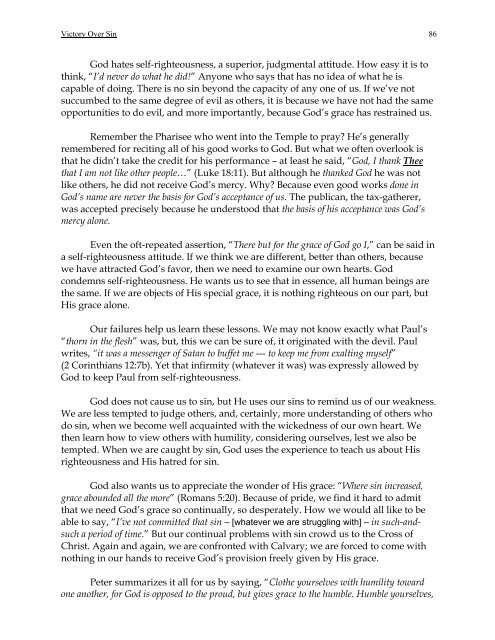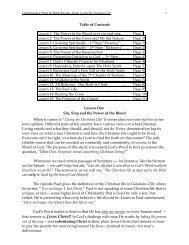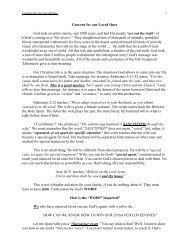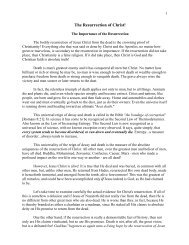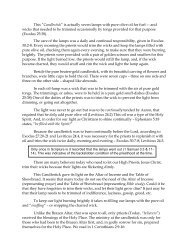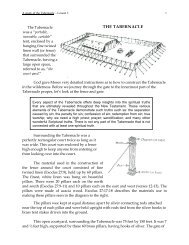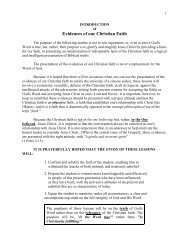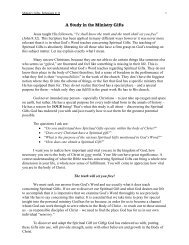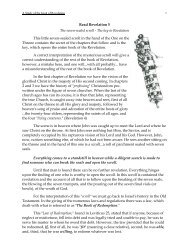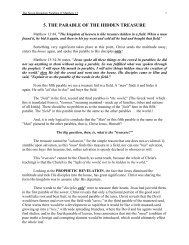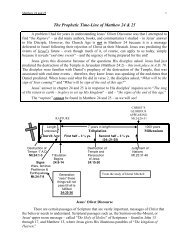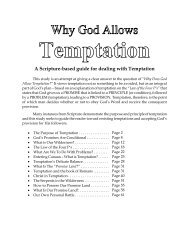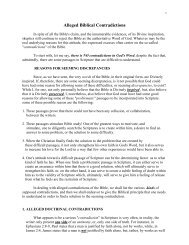Obtaining Victory Over Sin - NetBibleStudy.com
Obtaining Victory Over Sin - NetBibleStudy.com
Obtaining Victory Over Sin - NetBibleStudy.com
Create successful ePaper yourself
Turn your PDF publications into a flip-book with our unique Google optimized e-Paper software.
<strong>Victory</strong> <strong>Over</strong> <strong>Sin</strong> 86God hates self-righteousness, a superior, judgmental attitude. How easy it is tothink, “I’d never do what he did!” Anyone who says that has no idea of what he iscapable of doing. There is no sin beyond the capacity of any one of us. If we’ve notsuccumbed to the same degree of evil as others, it is because we have not had the sameopportunities to do evil, and more importantly, because God’s grace has restrained us.Remember the Pharisee who went into the Temple to pray? He’s generallyremembered for reciting all of his good works to God. But what we often overlook isthat he didn’t take the credit for his performance – at least he said, “God, I thank Theethat I am not like other people…” (Luke 18:11). But although he thanked God he was notlike others, he did not receive God’s mercy. Why? Because even good works done inGod’s name are never the basis for God’s acceptance of us. The publican, the tax-gatherer,was accepted precisely because he understood that the basis of his acceptance was God’smercy alone.Even the oft-repeated assertion, “There but for the grace of God go I,” can be said ina self-righteousness attitude. If we think we are different, better than others, becausewe have attracted God’s favor, then we need to examine our own hearts. Godcondemns self-righteousness. He wants us to see that in essence, all human beings arethe same. If we are objects of His special grace, it is nothing righteous on our part, butHis grace alone.Our failures help us learn these lessons. We may not know exactly what Paul’s“thorn in the flesh” was, but, this we can be sure of, it originated with the devil. Paulwrites, “it was a messenger of Satan to buffet me --- to keep me from exalting myself”(2 Corinthians 12:7b). Yet that infirmity (whatever it was) was expressly allowed byGod to keep Paul from self-righteousness.God does not cause us to sin, but He uses our sins to remind us of our weakness.We are less tempted to judge others, and, certainly, more understanding of others whodo sin, when we be<strong>com</strong>e well acquainted with the wickedness of our own heart. Wethen learn how to view others with humility, considering ourselves, lest we also betempted. When we are caught by sin, God uses the experience to teach us about Hisrighteousness and His hatred for sin.God also wants us to appreciate the wonder of His grace: “Where sin increased,grace abounded all the more” (Romans 5:20). Because of pride, we find it hard to admitthat we need God’s grace so continually, so desperately. How we would all like to beable to say, “I’ve not <strong>com</strong>mitted that sin – [whatever we are struggling with] – in such-andsucha period of time.” But our continual problems with sin crowd us to the Cross ofChrist. Again and again, we are confronted with Calvary; we are forced to <strong>com</strong>e withnothing in our hands to receive God’s provision freely given by His grace.Peter summarizes it all for us by saying, “Clothe yourselves with humility towardone another, for God is opposed to the proud, but gives grace to the humble. Humble yourselves,


